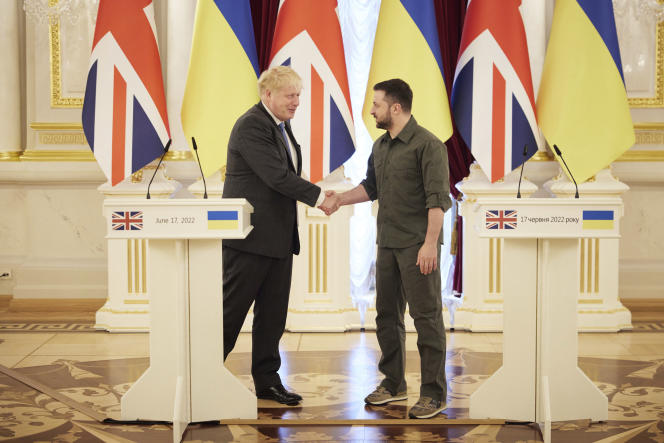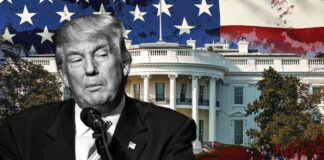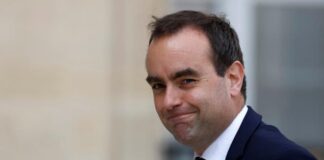“The United Kingdom is with you, and will be with you until victory. While Emmanuel Macron has never ceased to dialogue with Vladimir Putin’s Russia, the British Prime Minister, from the start of the invasion of Ukraine, opted for a hostile approach to Moscow. Banned from entering Russian territory, Boris Johnson traveled very early and twice to Ukraine while providing military and logistical support welcomed by Ukrainian President Volodymyr Zelensky.
Why did the UK choose early on to oppose Russia head-on? Did the domestic political worries faced by Boris Johnson have an influence on British diplomacy? Cécile Ducourtieux, correspondent for Le Monde in London, answered your questions during a chat on Friday July 1.
Yes and no. The Prime Minister is widely criticized for making a phone call to Ukrainian President Volodymyr Zelensky whenever he has a domestic political concern (and he has a lot at the moment, with the never-ending Partygate to weaken it).
But at the same time, Boris Johnson, his defense minister, Ben Wallace, and his foreign minister, Liz Truss, were very consistent, from the start – and even before – on Russian aggression in Ukraine. They unambiguously denounce an “illegal and unjust” war, ardently wish “the victory of Ukraine”, and the United Kingdom was the first European country to send weapons to kyiv (as of January 2022) – anti-tank missiles , the famous Nlaw, very popular in the Ukrainian army.
The Prime Minister’s attitude is not considered “warmonger” in the UK: there is remarkable national unity against the Russian war and unconditional support – for now – of the Ukraine. Labor even criticizes the Conservatives for having cut military budgets, that is to say.
It may seem hard to accept or understand, but while Boris Johnson and his government often appear to be exploiting their support for Kyiv for domestic political reasons, they are no less sincere in their foreign policy: the considerable military and financial support for Ukraine is there to prove it – 2.3 billion pounds sterling (2.6 billion euros) of military aid is dedicated by London to Ukraine.
Here is yet another of the paradoxes of the British position on Ukraine. The British government was the first in Europe to support kyiv militarily, but also one of the least generous on the continent with regard to Ukrainian refugees.
It requires a visa for people fleeing the country, and has set up two reception schemes (a kind of family reunification and another, based on reception with British individuals) which took a long time to be applied, due to lack of Home Office preparedness.
Many Ukrainians must have been discouraged before getting their visa. The figures have not been updated for a long time, but the latest showed around 70,000 Ukrainians arriving in the UK since the start of the war.
The British Prime Minister is on the same line as other Western leaders – they spoke with one voice at the G7 summit and the NATO summit which ended yesterday. Ukraine must be supported to win the war, and it is up to the Ukrainian government to decide when and how to negotiate peace.
No politician in the UK is calling for a rapprochement with Russia. Unanimity as to the position of the Johnson government is total. Even the Scottish separatists of the SNP, however quick to denounce Boris Johnson, are behind him and support his policy on Ukraine. No debate on this positioning in public opinion either.
Britain’s “anti-Russian” stance can be explained: Britain was attacked on its own soil in 2018, when ex-Russian agent Sergei Skripal was the victim of an attempted Novichok poisoning. The Foreign Office still has many Cold War specialists who have never ceased to be wary of Russia. In its Integrated Review, a ten-year vision of its international and defense policy, published in March 2021, the Johnson administration already unambiguously singled out Russia as “the most direct and acute threat”.
Another paradox of the British position on Russia. It is true that the Conservative Party turned a blind eye, out of cynicism or naivety (probably a mixture of the two), to the origin of the funds paid to it by generous Britons of Russian origin.
It is shocking that the British authorities have allowed a gray economy to proliferate in the City since the 1990s (a vast machine for recycling dirty money, say anti-corruption specialists), refusing to impose rigorous anti-money laundering regulations so as not to not discourage the flow of money arriving in particular from the former Soviet republics.
It is equally astonishing that people like Evgeny Lebedev, the son of a Russian agent, could be appointed as a member of the House of Lords… The fact remains that the opposition to Russian aggression in Ukraine is sincere , consensual, unambiguous.
Yes, British public opinion is very supportive of Johnson’s policy on Ukraine. The latter is not even discussed: the British do not systematically take to the streets to voice their opinions or disagreements, but they flooded charities with donations at the start of the conflict, and tens of thousands of people volunteered to welcome Ukrainians – it was the very restrictive and finicky policy of the Home Office that slowed them down in their outpouring of generosity.
To give you a striking and very recent example: on Wednesday June 29, Angela Rayner, the number two in the Labor Party, reputedly more to the left than the leader (Keir Starmer), strongly denounced the Conservatives’ cuts in the budget of the Ministry of Health. defense…
I would add, regarding your reference to the Blitz, that it probably plays into the British unconscious, in a country still inhabited by the memory of the Second World War. These images, testimonies of Ukrainians taking refuge in the metro in kyiv, obviously made one think of the scenes experienced by Londoners (and other Britons) between the autumn of 1940 and 1941.
Yes, most likely. If Boris Johnson is initially pushed, his or her Conservative replacement in Downing Street will develop the same policy. It is also very likely that if the Conservatives fail in the next general election (2023-2024), if the war in Ukraine continues – which is unfortunately to be feared – the Labor leaders in Downing Street will continue on a line approaching , without concession to Moscow.
This, incidentally, is one of the arguments of Boris Johnson’s opponents within the Conservative Party: they say that the argument that Mr Johnson should be kept in office because he has a “good” Ukrainian policy does not does not hold, because any other preservative would develop the same.
I can’t answer you very precisely – this data about the weapons that arrived versus the promises made is not always made public here. But London does not hide it, like other Western capitals: time passes between promises of delivery and the actual arrival of weapons on the battlefields.
It seems to me that this is not a problem specific to the British: all Westerners face problems of routing, and also problems of internal resources (the British army does not have infinite stocks of ammunition… ).
The British are unquestionably aligned with the Americans – unsurprisingly, London regards Washington as its very first ally. UK and US share intelligence data which very early on (mid-2021, fall 2021) signaled the high risk of Russian aggression in Ukraine. The two countries coordinated a lot when imposing sanctions on Moscow – just like with the EU.
But British foreign policy in Ukraine cannot be explained solely by alignment with Washington: very early on, Ben Wallace, the British defense minister, explained that Ukraine should not lose, because otherwise it was democracy that would lose to an autocratic and aggressive regime.
The new Chief of the General Staff, Sir Patrick Sanders, for example, warned this week of a “new 1937” – the historic mistake of the Europeans who failed to stop Hitler in time should not be repeated. betting on a fragile status quo at the expense of long-term peace and democracy.
Absolutely, another paradox that is barely noted by British politicians and media. It must be said that Brexit has become taboo here: it has divided public opinion so much that Labor avoids mentioning it, for example, for fear of turning potential voters against them again.
So few media – audiovisual in particular – point to the increasingly obvious economic damage of Brexit or point to the fact that Ukraine does not consider the European Union as a bureaucratic monster but as a guarantee of its attachment to the Western democratic bloc.
Boris Johnson like other Western leaders is currently unfolding a rather simple reasoning: first, it is up to the Ukrainians to decide when and how they will end this war. Secondly, we must support them, help them to resist and then to regain the ground lost (at least since the aggression of February 24) because certainly, this war is extremely costly in human lives, certainly, the risk of contagion to the rest of the is real.
But the alternative is worse: letting President Putin win would be a huge defeat for democracies in the face of autocratic rule. And that would be absolutely no guarantee of lasting peace: Putin says he wants to go beyond Ukraine, and European leaders have learned to take him at his word on such expansionist rantings.
Probably not much. In his defense, Boris Johnson was not the only one to make fun of President Putin’s pectorals – the exchange took place in front of the cameras, during one of the G7 round tables, and the Canadian Prime Minister, Justin Trudeau , was no exception. These are remarks mainly intended for the Western media. Johnson’s critique of Putin’s “toxic masculinity” is perhaps more interesting. But all this does not help the Ukrainians on the ground any more.

















